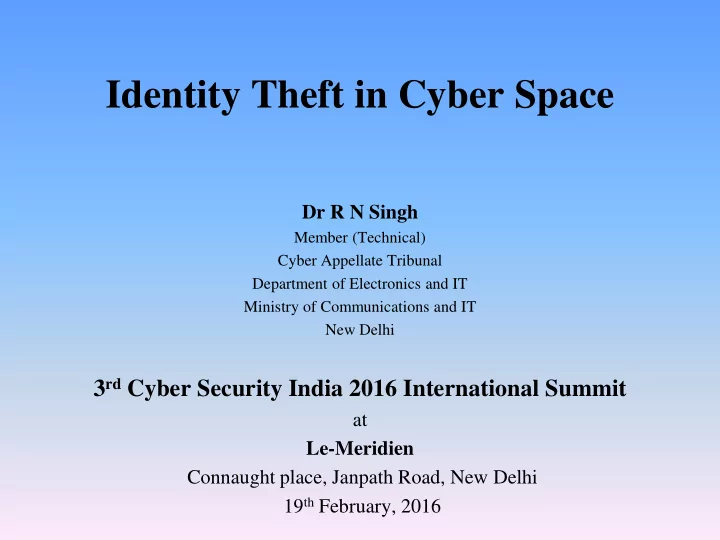

Identity Theft in Cyber Space Dr R N Singh Member (Technical) Cyber Appellate Tribunal Department of Electronics and IT Ministry of Communications and IT New Delhi 3 rd Cyber Security India 2016 International Summit at Le-Meridien Connaught place, Janpath Road, New Delhi 19 th February, 2016
Objectives • Define identity theft • Law & identity theft. • How Does it Happen? • Steps after incident. • Protect yourself.
Identity Theft • identity theft is a form of fraud or cheating of another person’s identity in which someone pretends to be someone else by assuming that person’s identity, typically in order to access resources or obtain credit and other benefits in that person’s name. • As per Sec 66C of IT (A) Act,2008, whoever fraudulently or dishonestly make use of the electronic signature, password or any other unique identification feature of any other person known as identity theft.
Law & Identify Theft • Introduction : Someone pretends to be someone else by assuming that person’s ID • IT Sections : 66C • IPC Sections : 419 • Punishment : If crime is proved, accused should punishable for 3 yrs Imprisonment or 1 Lakh fine or both. • Category of Crime : If under IT (Amend.) Act, 2008, Section 66C charge then this offence should be Bailable offence and also under IPC, 1860, Sec 419 charge it will be Bailable offence.
How does it Happen? • From discarded documents such as receipts, bills, and bank statements thrown in dustbins, personal identification documents. • Social engineering • Phishing e-mails, spasm e-mails • Fraudsters pretend to call or send mails and messages from an organization you are associated with such as banks etc. • Hacking • Keystroke software • Malware attacks
Steps After Incident • Inform your organization about the incident. • Verify the transaction and inform bank. Bank may be able to reverse the illegal transaction except credit cards and ATM transactions • Keep the records of complaint No. • After getting transaction details from bank file the complaint with legal authorities & Police. • Inform to credit information bureau about illegal transactions from your account.
Protect Yourself • Shred documents that contain sensitive information before you throw them in thrash • Never log into bank account using public Wi-Fi and cyber café. • Verify websites before passing on the information. • Better type link URL than clicking link. • Use https connections. • Use strong passwords. • Don’t pass on banking information on net to banks.
Recommend
More recommend